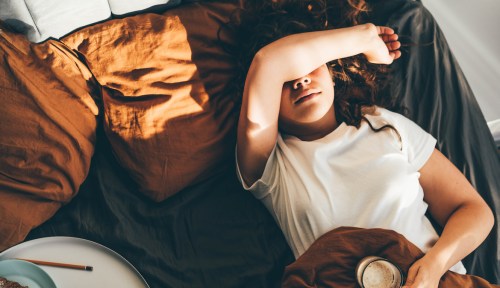When it comes to our health, sleep quantity and quality truly may be king. A good night’s restful sleep is shown to have a multitudeofbenefits, starting with a better quality of life. On the flip side, sleep deprivation is increasingly linked to systemic (body-wide) inflammation and a weakened immune response.
Experts in This Article
If you’ve ever found yourself with uncharacteristic swelling or getting sick more often, the root cause could be your sleep.
The science of the sleep/inflammation connection
What’s the biology behind this relationship between sleep and inflammation? “We’re not entirely sure!” says immunologist Jacob Offenberger. Though, he adds, there’s two main theories that might help explain it. “The first has to do with the glymphatic system, which is essentially a waste clearance system for the brain and central nervous system. With less duration or quality of sleep, this system isn’t as effective, which leads to inflammation. Arguably even more problematically, this creates a nasty cycle because less waste clearance in the brain decreases deeper sleep.”
The second concept focuses on blood pressure. “During restful sleep, blood vessels relax and blood pressure drops,” Dr. Offenberger says. “However, when you’re not sleeping well, blood pressure remains elevated, which may trigger inflammatory cells to turn on.”
Additionally, research shows that sleep deprivation often results in higher and more sustained levels of reported stress, which is known to trigger both inflammation and a dampened immune response.
How do we fix this?
Here’s a simple solution: Get more sleep, and get better quality sleep! Easy right?
In all seriousness, with so many different variables that can affect our sleep, the reality is that sometimes we just don’t have the time or capacity to make the changes we’d need to get better rest.
But what if there’s another possible way to reduce the inflammatory and immune system consequences that comes with sleep deprivation? Recent research has looked at that very topic by examining the relationship between sleep restriction, inflammatory and immune system markers, and exercise.
One such study split subjects into three different groups: a normal sleep group that got eight hours in bed for five consecutive nights, a sleep restricted group that got four hours in bed for five nights, and a sleep restriction and exercise group that got four hours in bed and three sessions of exercise over the course of five nights.
The research showed—like many previous studies—that the sleep restricted group had increased activation of the immune system and inflammatory pathways. However, the sleep restricted group that had exercised had significantlyless activation.
Another study that followed over 11,000 subjects over eleven years found that exercise could alleviate numerous potential negative effects of sleep deprivation—including inflammation. Interestingly, the main point of this study wasn’t even looking at that relationship, but the evidence pointed so strongly towards it that it became a key finding. (Sometimes, the best things do just fall into your lap!)
Yet another study, focused on older populations—since aging has been linked to increased inflammation and poorer sleep quality—found those who practiced moderate exercise had a key decreased inflammatory marker (cytokines, to be specific) and improved sleep.
So, how much exercise do you need to do?
There’s no cut-and-dry protocol here but, as a physical therapist, here’s what my recommendations are, based on the research: For those under 55, complete a minimum of three high-intensity interval sessions lasting at least 20 minutes each (preferably in the late morning) per week or at least 150 minutes of moderate-intensity exercise on a weekly basis. For those over 55, complete a minimum of three 60-minute moderate-intensity sessions per week.
Not only will getting this much activity help with sleep, and reduce the negative side effects when you don’t get enough of it, but it will also improve your quality of life in general.
Get in your 20-minute HIIT session today:
Sign Up for Our Daily Newsletter
Get all the latest in wellness, trends, food, fitness, beauty, and more delivered right to your inbox.
Got it, you've been added to our email list.











